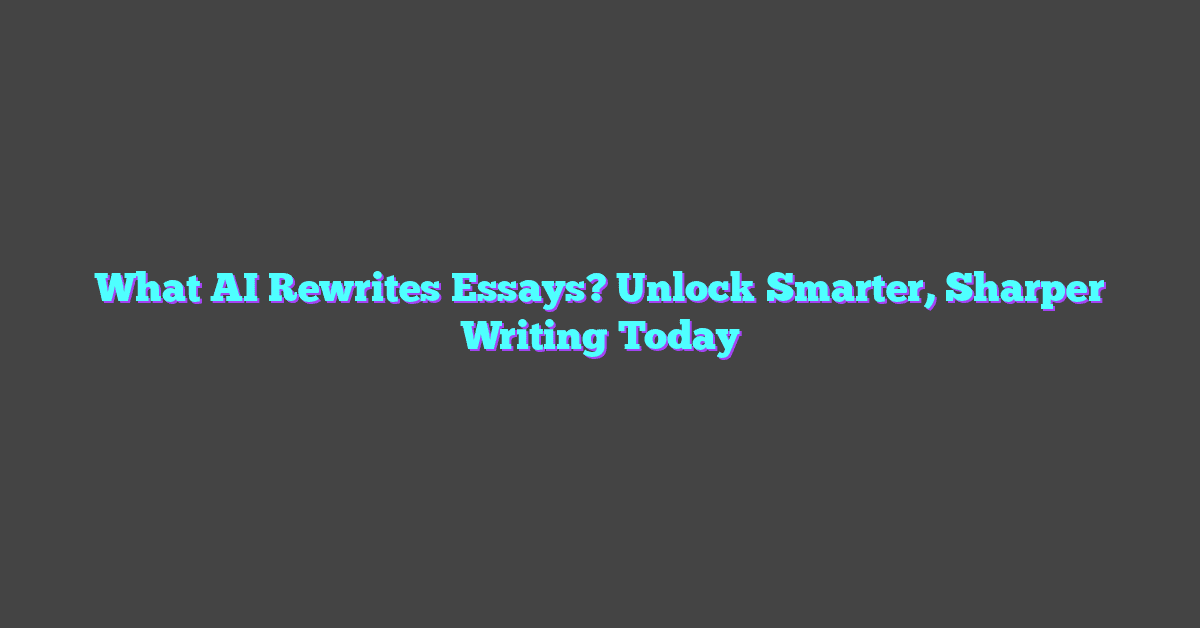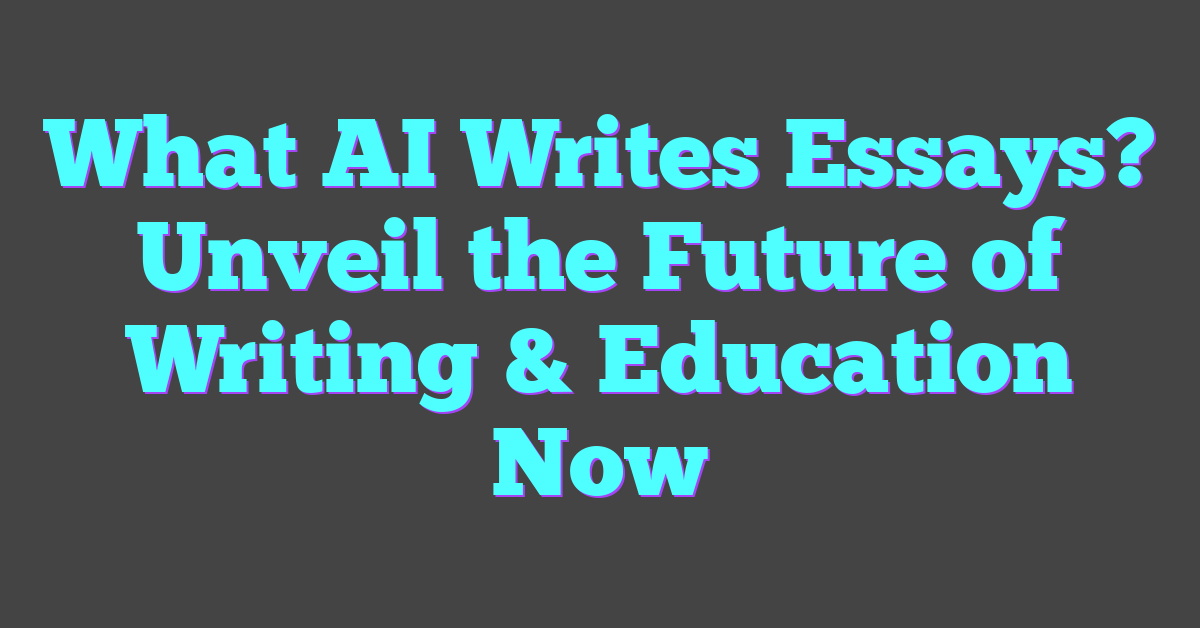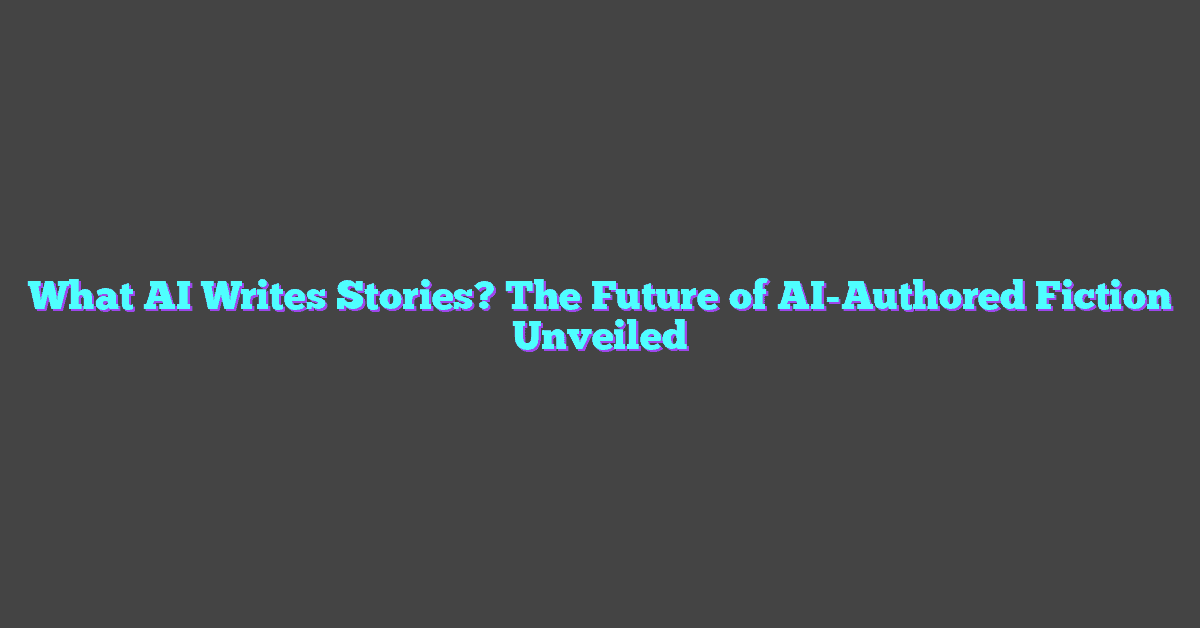Imagine turning a basic draft into a polished gem without hours of tedious editing. That’s the magic of AI essay rewriters. They’re revolutionizing the way we approach writing, offering a helping hand to refine our thoughts with the click of a button.
In this article, they’ll dive into how AI rewriters work their magic. From enhancing vocabulary to restructuring sentences, they’ll explore the innovative features that make these tools a game-changer for students, professionals, and anyone looking to elevate their writing.
Whether you’re curious about the technology behind it or seeking the best AI writing assistant for your needs, stick around. You’re about to discover how these digital wordsmiths can transform your essays from good to great.
How AI Rewrites Essays
AI essay rewriters work by using complex algorithms to analyze and process text. They’re built on machine learning models trained on vast datasets of high-quality writing across numerous subjects and styles. As users input their text, the AI goes to work, dissecting each sentence to comprehend the context and meaning.
The first step for these AI tools involves a deep analysis of the content. They look for the structure, grammar, and style nuances that make up the piece. By understanding the core ideas and the flow of the text, the AI can preserve the original intent while enhancing the overall readability.
They achieve this by:
- Identifying weak verbs and replacing them with more dynamic ones
- Finding and substituting overused words to avoid repetition
- Rearranging sentence structures for clarity
- Correcting grammatical errors
- Enhancing vocabulary with synonyms
Unlike simple thesaurus tools, these sophisticated algorithms ensure that replacements and structural changes are contextually appropriate. They consider the tone and voice of the original text meaning the output remains true to the author’s essence.
Perhaps the most compelling feature of AI essay rewriters is their ability to offer suggestions for making text more engaging. They can sense dull passages and breathe life into them without straying from the essay’s thesis. The AI can provide alternative phrasing that conveys the same message but with a fresh twist, making the essay not just corrected but more compelling to read.
The speed of AI rewriting tools is staggering. Within moments, what might have taken a person hours of editing is completed. Yet, they don’t just offer speed—they provide an elevated level of consistency that’s hard to match. Every edit preserves the user’s voice, ensuring the final product is not just grammatically sound but also retains its unique character.
For all sorts of writers, the implications are clear. The daunting task of editing is no longer a solitary battle with one’s work. Instead, it’s a partnership with intelligent technology that nudges the essay toward perfection with every suggested change.
The Magic of AI Essay Rewriters
AI essay rewriters are a marvel of modern technology, transforming how writers approach the editing phase of content creation. At the core of these sophisticated tools are advanced machine learning algorithms that thrive on vast datasets to learn the nuances of the English language. These algorithms enable the tools to not just replace words but reshape sentences, ensuring that the flow and original meaning remain untouched.
A notable feature of AI rewriters is their capacity for semantic understanding. They don’t just scan for keywords; they grasp the context. This means they can maintain an essay’s tone, style, and author’s voice, which is crucial for a piece’s authenticity. For those fascinated by AI and machine learning, watching these tools at work is like observing a well-orchestrated dance between science and language.
For content creators, AI essay rewriters are less like assistants and more like partners in the creative process. They bring a level of consistency to writings that human editors might struggle to maintain, especially when working under tight deadlines. Transforming awkward phrasing into clear, concise language, these tools can elevate writing in ways that not only impress readers but also retain their engagement.
Accessibility is another key aspect that underscores the appeal of these rewriters. They’re available around the clock, providing immediate assistance to anyone from students to professional writers. This constant availability means that inspiration can strike at any hour, and writers can rely on AI rewriters to polish their drafts into final pieces ready for publication.
The integration of AI in content creation has just begun to unfold its potential. With each iteration and update, AI essay rewriters are becoming more adept at understanding intricacies and style variations. They’re not only changing the way texts are edited but also empowering writers to focus more on the creative aspect of writing. As machine learning algorithms continue to evolve, so too will the capabilities of these exciting tools, shaping the future of writing and content creation.
Enhancing Vocabulary with AI Rewriters
Expanding one’s lexicon can be a formidable task, but AI essay rewriters simplify it with effortless aplomb. These tools are ingrained with comprehensive thesauruses and databases, allowing them to suggest synonyms and replace words to enhance the overall vocabulary of any text. They do more than just swap out words; they understand context to ensure that the enhanced vocabulary fits seamlessly within the content’s structure.
The AI algorithms behind these tools are programmed to identify words that are overused or simplistic and to propose more sophisticated alternatives that refine the text. For writers, this means their work isn’t just replaced with complex language but is elevated in a way that retains clarity and readability. Sophistication without sacrificing accessibility is the hallmark of these AI systems, as they provide suggestions that writers may not have considered otherwise.
Moreover, these rewriters can adapt to various writing styles and technical levels. Whether it’s crafting an article with industry-specific jargon or storytelling with descriptive language, AI essay rewriters can tune the vocabulary to match the intended audience. Here’s what they offer:
- Context-Aware Synonym Suggestions: Recognize appropriate times to enhance vocabulary based on the surrounding text.
- Technical Jargon Integration: For more specialized articles, incorporate industry-specific terminology to speak directly to professionals in the field.
- Language Simplification: Conversely, they can simplify language for broader audiences, ensuring the content is approachable.
Ultimately, AI rewriters help writers break the monotony of repetitive word use and inject a fresher, more dynamic lexicon into their writing. They provide insights into word choice that elevate the content’s sophistication without alienating readers who may not be familiar with highly academic or technical terminology. With these AI-powered assistants, content creators can continue to learn and grow their vocabulary effortlessly, ensuring that their writing remains vibrant and engaging.
Restructuring Sentences with AI Rewriters
AI rewriters shine when it comes to restructuring sentences to improve both flow and readability. They delve into the core structure of a sentence, identify components like the subject, verb, and object, and proficiently rearrange these elements without losing the initial intent. This capability stems from an in-depth understanding of grammar rules and linguistic patterns, a feat achievable through advanced machine learning algorithms.
The restructuring process typically involves expanding compact sentences for clarity or condensing long-winded passages for brevity. It’s not just about moving words around; AI rewriters assess context, ensuring that each modified sentence aligns with the surrounding content. They preserve critical details while trimming redundant phrasing, maintaining the author’s voice throughout.
Another key aspect is the AI’s adaptation to different writing styles. Whether the original text is expository, descriptive, persuasive, or narrative, the rewriter tailors its transformations to uphold the genre-specific conventions. This versatility makes AI tools a valuable companion for writers across various domains.
- Expanding or condensing sentences for desired impact
- Preserving author’s voice and writing style
- Removing redundant phrasing while retaining essential information
AI rewriting tools also tackle complex sentence structures, breaking them down into simpler forms when necessary. It’s a balance between simplification and sophistication, enhancing the text to make it accessible to a wider audience while ensuring it retains its original complexity when needed. Marketable content often requires this touch of simplicity without sacrificing depth or meaning.
The integration of AI-driven rewriting into a writer’s toolkit opens up opportunities for refining content in ways that were previously time-consuming or challenging. As machine learning technology continues to evolve, these tools are poised to become even more nuanced in their ability to reshape written material. With a combination of natural language processing and an ever-growing database of linguistic nuances, AI rewriters are indeed revolutionizing how writers approach the editing and polishing phase of content creation.
The Technology Behind AI Rewriters
Delving into the mechanics of AI essay rewriters reveals a landscape where advanced algorithms meet language. At the core of these cutting-edge tools is Natural Language Processing (NLP), a branch of AI that specializes in the interaction between computers and human language.
AI rewriters employ NLP to understand context and semantics. They assess the input text through a technique known as semantic analysis. By examining word relationships within sentences, AI distinguishes subtleties of meaning and interprets text similarly to how a human would.
Another critical component is machine learning (ML), which enables AI rewriters to learn and adapt over time. With each use, they analyze feedback and outcomes to refine their capabilities. They’re not just working with a static set of rules; they’re constantly evolving. Here’s how it generally unfolds:
- AI is trained on large datasets comprising diverse text samples.
- It learns patterns, structures, and nuances of language.
- Through iterative processing, AI refines its rewriting strategies.
This ongoing learning process ensures that rewriters become more sophisticated and adept at handling a wide range of writing styles and complexities. AI rewriters utilize ML to achieve a higher level of performance, ranging from simple paraphrasing to complete content restructuring.
Transformative algorithms enable AI rewriters to carry out functions that go beyond basic synonym replacement. They can reorganize sentences, alter sentence length for impact, and retain the original style and tone, all of which contribute to a refined and fluent rewritten text.
The integration of technologies like deep learning further augments the prowess of AI rewriters. Deep learning models, inspired by the neural networks of the human brain, enhance the AI’s ability to discern and replicate intricate language patterns. They process vast amounts of text to understand how words connect in human language, making rewrites more accurate and contextually relevant.
By interweaving these technical aspects, AI rewriters transform writing in a manner that retains authenticity while ensuring clarity and engagement.
Choosing the Best AI Writing Assistant
When selecting an AI writing assistant, several factors come into play to find the perfect match for a writer’s needs. These smart tools are plenty, but not all are created equal. The proficiency in handling complex syntax, creativity in vocabulary enhancement, and customizability to match one’s writing style are hallmarks of superior AI rewriters.
First off, consider the technology behind the tool. The best AI rewriters employ cutting-edge NLP and ML algorithms that enable a deep understanding of language intricacies. They’re not just replacing words but are efficiently rephrasing for improved clarity and coherence. They should be able to grasp the subtleties of the content, echoing the original intent and tone flawlessly.
User Interface and Experience also weigh heavily on the usefulness of an AI writing assistant. Ideally, it should offer a clean, intuitive interface that doesn’t require a steep learning curve. Integration with commonly used platforms such as word processors or content management systems adds layers of convenience, allowing writers to streamline their workflow.
Another crucial factor is versatility. Whether it’s a marketing copy, an academic essay, or a technical report, the AI assistant should adapt its rewrites accordingly. Look for features that provide control over rewriting techniques and enable the injection of varied levels of creativity and technicality, aligning with the target audience’s understanding.
Performance and speed are paramount. Writers value tools that work quickly without compromising on quality. Efficiency in generating multiple rewrite suggestions is an advantage, especially when dealing with bulk content or tight deadlines.
Lastly, data security can’t be overstated. With concerns about intellectual property and privacy, choosing an AI assistant that guarantees the security of your content is a must. Trustworthy AI tools ensure that your work remains confidential, with strong policies and encryption in place to protect your data.
By carefully considering these elements, writers can leverage AI writing assistants to elevate their content creation, ensuring their work is not just precise and well-crafted but also impressively polished. As the AI continues to learn and evolve, these tools become increasingly indispensable allies in the writing process.
Conclusion
AI rewriters are reshaping the landscape of content creation, offering writers a powerful tool to refine and enhance their work. They’re not just about swapping out words but about elevating the quality of writing with every edit. As technology advances, these tools become more adept at understanding nuances and preserving the writer’s unique voice. Whether it’s to enrich vocabulary, restructure for better flow, or tailor content to specific audiences, AI rewriters stand ready to assist. They’re the unsung heroes in the writer’s journey toward clearer, more impactful communication. With the right AI assistant, writers can ensure their message isn’t just heard—it’s remembered.
Frequently Asked Questions
What are AI essay rewriters and what do they do?
AI essay rewriters are digital tools that utilize advanced technologies like Natural Language Processing (NLP) and machine learning to reformulate written content. They enhance vocabulary, preserve the writer’s tone and style, and improve sentence structure for better flow and readability.
How do AI rewriters maintain the original meaning of a text?
AI rewriters have semantic understanding capabilities that allow them to grasp and maintain the context and tone of the original writing. They use synonyms and restructure sentences without altering the intended message.
Can AI rewriters adapt to different writing styles?
Yes, AI rewriters can adapt to various writing styles and technical levels, whether incorporating industry-specific jargon or simplifying language for a general audience, thereby catering to a wide range of content needs.
Why are AI rewriters beneficial for writers?
AI rewriters help writers overcome the repetitiveness of word use, bringing fresh vocabulary into their work, and improve sentence fluency. They save time in the content refinement process and ensure the final draft is polished and engaging.
What technology is behind AI writing assistants?
AI writing assistants are powered by Natural Language Processing (NLP) for understanding context and semantics and machine learning to improve over time. Additionally, transformative algorithms enable them to restructure content and enhance its quality.
How do AI writing assistants ensure data security?
When choosing an AI writing assistant, it’s important to consider the data security measures in place. Writers should look for tools that provide strong encryption and privacy policies to ensure their information remains secure.





